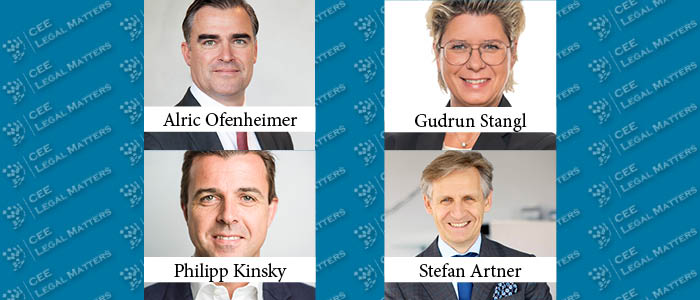With legal services in a constant state of technology-driven evolution, Austria-based Legal Tech Hub Europe is trying to revolutionize the legal industry by fostering innovation and embracing the digital future. Partners from Dorda, E+H, Herbst Kinsky, and Schoenherr – four of the five firms spearheading the hub – talk about the initial set-up of the LTHE and its milestones over the last six years.
The Vision of Legal Tech Hub Europe
The Legal Tech Hub Europe was initially launched in 2018 by five founding law firms: Dorda, E+H, Herbst Kinsky, Schoenherr, and SCWP Schindhelm. “Initially named Legal Tech Hub Vienna, the imperative to shift focus toward the broader European market quickly became apparent,” explains Schoenherr Partner and COO Gudrun Stangl, who is also a board member of the LTHE.
“The core objective of the LTHE is to enable and promote innovation in private law practice and beyond to meet the evolving demands of clients in a world undergoing profound changes,” Stangl continues. “For instance, the emergence of generative artificial intelligence has sparked various projects, one of which being the LTHE Innovators’ Forum.” The LTHE Innovators’ Forum, first held in 2023, was a gathering ground for Managing Partners of independent European law firms, and, according to Stangl, it further cemented the LTHE’s reputation. “Various issues and topics were covered, such as the effect of technology on the future role of the lawyer,” she says. “The creation of the LTHE Innovators’ Forum was a major step toward thought leadership, offering a forum for high-level strategic exchange amongst the most significant independent law firms in Europe,” Stangl stresses.
From Concept to Reality
“To date, the LTHE is a unique cross-firm initiative of leading law firms,” continues Herbst Kinsky Partner Philipp Kinsky – also an LTHE Board Member. He explains that, in addition to the law firms themselves, LTHE also includes other partners such as tax firms and universities or general cooperation partners. “LTHE’s goal is to lead the lawyering sector into the digital future in a proactive, customer-orientated, and innovative way – beyond the borders of Austria, with a focus on Europe, including the CEE region,” Kinsky says.
He goes on to explain that the basis of the “digital growth of LTHE members” was the “constant identification as well as development of technical solutions and opportunities,” over the past six years. “In the last five years, the LTHE’s accelerator program fostered the cooperation between legal tech start-ups and the member law firms – for example, working together on various challenges, such as the implementation and roll-out of contract automation or use of AI solutions,” Kinsky exemplifies. “Other activities included local and international cooperation with interest groups, universities, and legal tech hubs as well as the development of standards for the legal industry and partnerships.”
As Kinsky puts it, “a trustworthy and respectful exchange within the LTHE is paramount and provides the ideal basis for a digital mindset. Working together with innovative legal tech providers and creating new products relevant to our markets and needs is the main benefit of the LTHE.”
Challenges and Opportunities in Legal Tech
“Establishing a legal-tech hub in Europe fosters innovation through collaboration, provides access to diverse talent, facilitates networking with investors and partners, and enables engagement with regulators to navigate complex legal landscapes,” explains Head of the LTHE Advisory Board and Dorda Partner Stefan Artner. “However, challenges such as fragmented regulations, data privacy concerns, limited funding opportunities for start-ups, and cultural diversity present obstacles to market expansion and product development. Overcoming these hurdles requires strategic approaches and regulatory agility to foster a supportive ecosystem for legal tech innovation in Europe,” he says.
According to Artner, the LTHE has “successfully mastered these challenges by co-creating a KYC product in 2023.” As Artner explains, this milestone entailed helping streamline the KYC workflow and process within firms and “freed up fee earners’ time as well as enhancing clients’ KYC experience even further.” Moreover, he stresses that “each founding member law firm continues to strive with their individual legal tech strategy and road map to enhance digital legal services, especially as we see a higher demand from clients in respect to digital delivery of our daily work.”
“Being prepared and exploring specific use cases for generative artificial intelligence tools has been a focus over the last 18 months,” Artner continues. “We fully appreciate the profound significance of artificial intelligence and legal tech for the legal sector. The continuous advancement in these technologies presents us with the opportunity to enhance our processes, boost efficiency, and deliver an even better level of service to our clients,” he explains.
Fostering Innovation and Collaboration
“More recently, the LTHE focuses on AI, blockchain, data privacy, and ethics, exploring solutions for legal research, data analysis, cooperation tools, contract generation, and compliance,” chimes in E+H Partner and LTHE Board Member Alric Ofenheimer. “The LTHE collaborates with industry and academic partners to drive advancements in the legal tech sector,” he explains.
“Over the last six years, we have engaged and tested various legal tech solutions starting from document automation to testing and understanding use cases for generative AI. The LTHE gives us the opportunity to see various sides and aspects of the technologies and exchange views on legal tech experiences,” Ofenheimer concludes.
This article was originally published in Issue 11.2 of the CEE Legal Matters Magazine. If you would like to receive a hard copy of the magazine, you can subscribe here.














